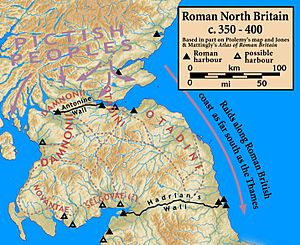Great Conspiracy facts for kids
Quick facts for kids The Great Conspiracy |
|||||||
|---|---|---|---|---|---|---|---|
| Part of the Roman occupation of Britain | |||||||
 Northern Roman Britain, c. 350–400 AD. |
|||||||
|
|||||||
| Belligerents | |||||||
| Picts Scotti Attacotti Saxons Franks Roman deserters rebellious Britons |
|||||||
| Commanders and leaders | |||||||
| Nectaridus † Fullofaudes Severus Jovinus Count Theodosius |
Valentinus and others | ||||||
The Great Conspiracy was a big problem in Roman Britain. It was a time of war and confusion that lasted about a year. A historian named Ammianus Marcellinus called it a 'barbarian plot'. It happened because the Roman army in Britain was weak. Many soldiers had left to fight in a civil war, and not many came back. This meant there weren't enough soldiers, and their pay and supplies might have been bad.
It's hard to know exactly when everything happened. The main information comes from Ammianus, but he was far away in Antioch. So, his details might not be perfect or might even be a bit mixed up.
Contents
What Was the Great Conspiracy?
How the Attacks Began
In the winter of 367, Roman soldiers guarding Hadrian's Wall rebelled. They let the Picts from Caledonia (modern-day Scotland) cross into Britain. At the same time, other groups also attacked. The Attacotti and the Scoti from Hibernia (modern-day Ireland) landed on the western coast. The Saxons from Germania landed on the southeastern coast. These attacks might have been planned together.
These groups managed to take over many Roman outposts and towns. Some Franks and Saxons also landed in northern Gaul (modern-day France).
Roman Leaders Under Attack
During these attacks, two important Roman leaders were affected. Nectaridus, who was in charge of the sea coast, was killed. Another general, Fullofaudes, was either trapped or captured. We think these events happened in Britain, but they might have happened in Gaul. The Roman army units that were still loyal stayed safe inside cities in the southeast.
Spies and Robbers
The miles areani were local Roman agents. Their job was to gather information about what the barbarian groups were doing. But it seems they took bribes and betrayed the Romans. This meant the attacks came as a complete surprise.
Many Roman soldiers left the army, and some slaves escaped. These people roamed the countryside and became robbers to survive. Even though the chaos was widespread, the rebels mostly wanted to get rich. They worked in small groups, not as big armies.
What Happened Next?
The Roman Response
The Roman Empire sent a skilled general named Count Theodosius to Britain. He arrived with a strong army to fix the situation. Theodosius quickly brought order back to the province. He defeated many of the attacking groups and restored Roman control.
Lasting Effects
Count Theodosius returned to Rome as a hero. He became a top military advisor to the emperor. His son later became emperor himself.
The Romans stopped most of the chaos. However, raids by the Picts, Scotti, Attacotti, and Saxons continued for some time after the Great Conspiracy.
 | Precious Adams |
 | Lauren Anderson |
 | Janet Collins |

